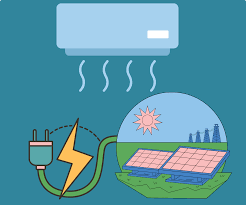
With the sweltering summer heat in many parts of India, air conditioning has become an essential amenity for homes and businesses alike. However, running an AC unit can be an expensive affair, contributing significantly to soaring electricity bills. This has led many to wonder if solar panels, a clean and renewable source of energy, can be a viable solution for powering their air conditioning systems. In this blog, we'll explore the capabilities of solar panels for running ACs and shed light on the latest advancements.
Understanding Solar Panel Capacity
Before delving into whether solar panels can run ACs, it's essential to understand how solar panel capacity is measured. The capacity of a solar panel is typically expressed in watts (W) or kilowatts (kW), which represents the maximum amount of electricity it can generate under ideal conditions. The higher the capacity, the more electricity the panel can produce.
Most residential solar panel systems in India range from 1 kW to 10 kW, with the average system size being around 5 kW. It's critical to note that the actual output of a solar panel system depends on a variety of factors, such as the amount of sunlight, the angle of the panels, and the efficiency of the system components.
Air Conditioner Power Consumption
Air conditioners are notorious for their high power consumption, which can vary based on factors such as the unit's capacity, energy efficiency rating, and usage patterns. In India, a typical window AC unit with a 1.5-ton capacity consumes around 1.5 kW of electricity when operating at full load.
To run a 1.5-ton AC unit solely on solar power, you would need a solar panel system with a capacity of at least 1.5 kW, assuming optimal sunlight conditions and no other electrical loads. However, it's important to consider that air conditioners rarely run at full load continuously, and their power consumption fluctuates based on cooling demand.
Can Solar Panels Run AC?
Solar panel technology has advanced significantly, making it more viable to power air conditioning systems with solar energy. Here are some key developments and considerations:
1. Increased Efficiency: Solar panel efficiency has been steadily improving, thanks to ongoing research and technological advancements. In 2024, high-efficiency solar panels with conversion rates of up to 25% will be commercially available, allowing homeowners to generate more electricity from a smaller roof area.
2. Battery Storage Solutions: The integration of battery storage systems with solar panels has become more prevalent and affordable. These batteries have the ability to store excess solar energy generated during the day, which can then be used to power ACs or other appliances during peak demand periods or at night.
3. Smart Energy Management: Advanced energy management systems have emerged, enabling users to monitor and optimize their solar energy consumption. During peak hours, these systems can automatically prioritize powering essential loads, like ACs, while deferring non-essential loads to times when solar production is higher or drawing from battery reserves.
4. Hybrid Systems: To address the intermittency of solar power, hybrid systems that combine solar panels with other renewable sources, such as wind turbines or even grid-tied systems, have gained traction. These hybrid solutions can provide a more consistent and reliable source of power for running ACs and other high-load appliances.
5. Government Incentives: The Indian government has introduced various incentives and subsidies to encourage the adoption of solar energy, making it more affordable for households and businesses to install solar panel systems capable of powering ACs.
While the feasibility of running ACs solely on solar power depends on factors like the size of the AC unit, the capacity of the solar panel system, and the local climatic conditions, the advancements in solar technology have made it increasingly viable as of 2024. However, it's essential to consult with solar experts and perform thorough calculations to determine the optimal system size and configuration for your specific AC cooling requirements.
It's worth noting that the initial investment in a solar panel system capable of running ACs can be substantial, but the long-term savings on electricity bills and the environmental benefits often outweigh the upfront costs. Additionally, many states in India offer attractive subsidies and tax incentives for residential and commercial solar installations, further improving the economic viability of such systems.
As the world becomes more conscious of the need for sustainable energy solutions, solar power is increasingly being recognized as a game-changer in the fight against climate change and rising energy costs. By harnessing the abundant and renewable energy from the sun, households and businesses can not only reduce their carbon footprint but also enjoy reliable and cost-effective cooling solutions, even during the hottest summer months.
If you're considering switching to solar power to run your air conditioning system or meet your overall energy needs, look no further than Waaree, a leading solar company in India. With cutting-edge solar panel solutions, expert installation services, and a commitment to sustainability, Waaree can help you harness the power of the sun and reduce your carbon footprint while enjoying cost-effective and reliable cooling.



